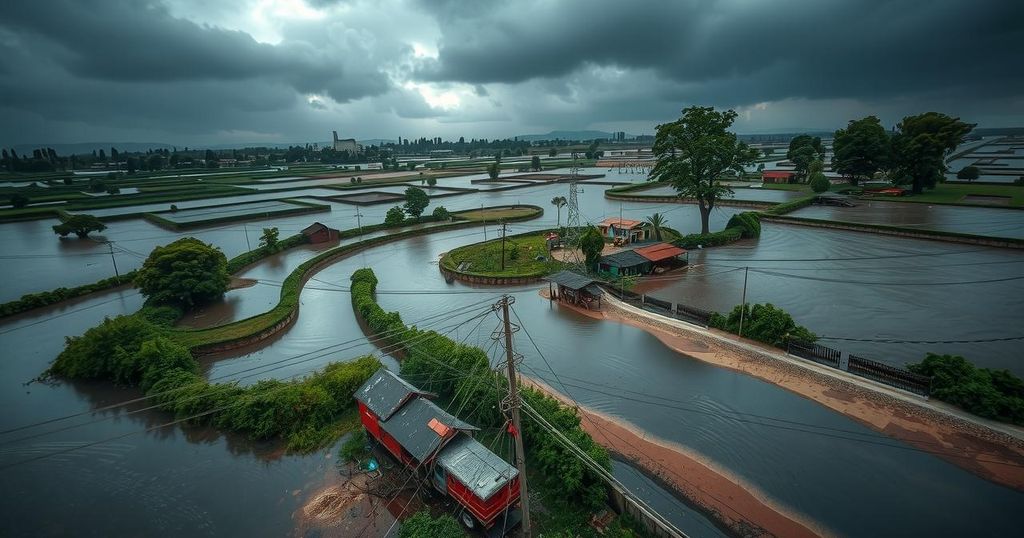Flooding in Africa has become increasingly severe due to climate change, severely affecting communities, particularly in Nigeria. Idris Egbunu’s experience exemplifies the annual cycle of damage and displacement stemming from floods. This year, around 6.9 million individuals have been impacted, with predictions indicating worsening conditions if fossil fuel consumption continues unchecked. The article outlines the urgent need for global emissions reduction efforts to address these climate-related challenges.
Climate change continues to exacerbate flooding across Africa, particularly impacting communities in Nigeria’s Kogi state. Idris Egbunu, a 67-year-old resident, recounts the annual ordeal, as floods from the Niger River uncontrollably inundate his home every rainy season. Despite the recurrent damage, he faces the reality each year of returning to clean and repair his residence before the next deluge arrives. This year, approximately 6.9 million individuals in West and Central Africa have already suffered the devastating consequences of extreme rainfall, placing them at severe risk. Reports indicate that flooding is more brutal this season, with local officials noting that Kogi state has seen increasing flood intensity since 2012. In 2022 alone, Nigeria experienced its deadliest floods in a decade, which resulted in over 500 fatalities and displaced 1.4 million individuals. Local emergency response adviser Sandra Musa noted the alarming trend this year, stating, “Usually at this time of year the water level drops, but here it’s rising again.” Residents like Fatima Bilyaminu, a local shopkeeper, express profound losses, stating she lost all her belongings due to flooding, which now renders her living conditions perilous. It is essential to emphasize that Africa, which accounts for just approximately four percent of global greenhouse gas emissions, disproportionately bears the brunt of climate change. The World Meteorological Organization reports increasing rainfall and extreme weather events, such as those observed in Niger, Chad, Cameroon, and Guinea. In Mali, severe floods have left significant infrastructure damage, even damaging UNESCO World Heritage sites. The changing climate is becoming a yearly cycle of flooding rather than a periodic phenomenon, according to Clair Barnes of the Centre for Environmental Policy at Imperial College London. Experts warn that the intensity and frequency of such extreme weather events will escalate if fossil fuel consumption remains unchecked, with predictions that by 2030, 118 million impoverished Africans could face increased drought, floods, and heat surges. Governments are urged to reconsider urban planning in relation to climatic changes, emphasizing the critical need for reduced greenhouse gas emissions globally. Aida Diongue-Niang from the UN Intergovernmental Panel on Climate Change elucidated, “That doesn’t fall to the region — it falls to the whole of humanity.”
The article focuses on the significant impact of climate change on flooding in Africa, particularly in Nigeria’s Kogi state. Floods have become a recurrent threat due to altered weather patterns and increased rainfall intensity caused by climate change. The discourse sheds light on the humanitarian crisis stemming from these floods, which jeopardize food security and threaten the livelihoods of millions of individuals. The article highlights the growing frequency of extreme weather events attributed to climate change and the urgent need for global emissions reduction as a means to address these challenges.
In conclusion, the ongoing and escalating flooding crises in Africa underscore the severe repercussions of climate change on vulnerable populations. With millions affected and the frequency of such events increasing, it is imperative for global communities to enact measures aimed at reducing greenhouse gas emissions. As highlighted, this is not solely an African issue but a global challenge that necessitates collective action to mitigate climate change and its devastating effects.
Original Source: www.rfi.fr






